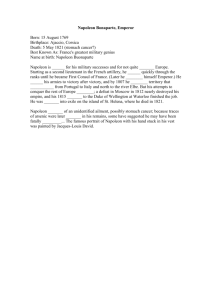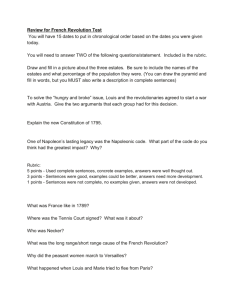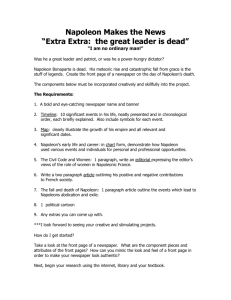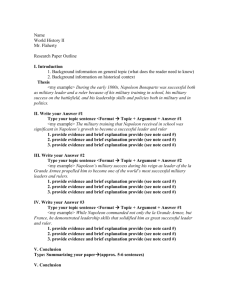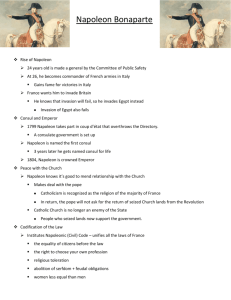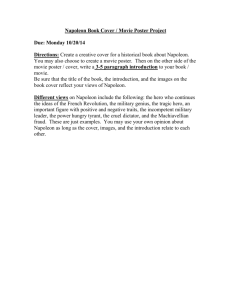“Napoleon Bonaparte was a tyrant and oppressor of his people and
advertisement
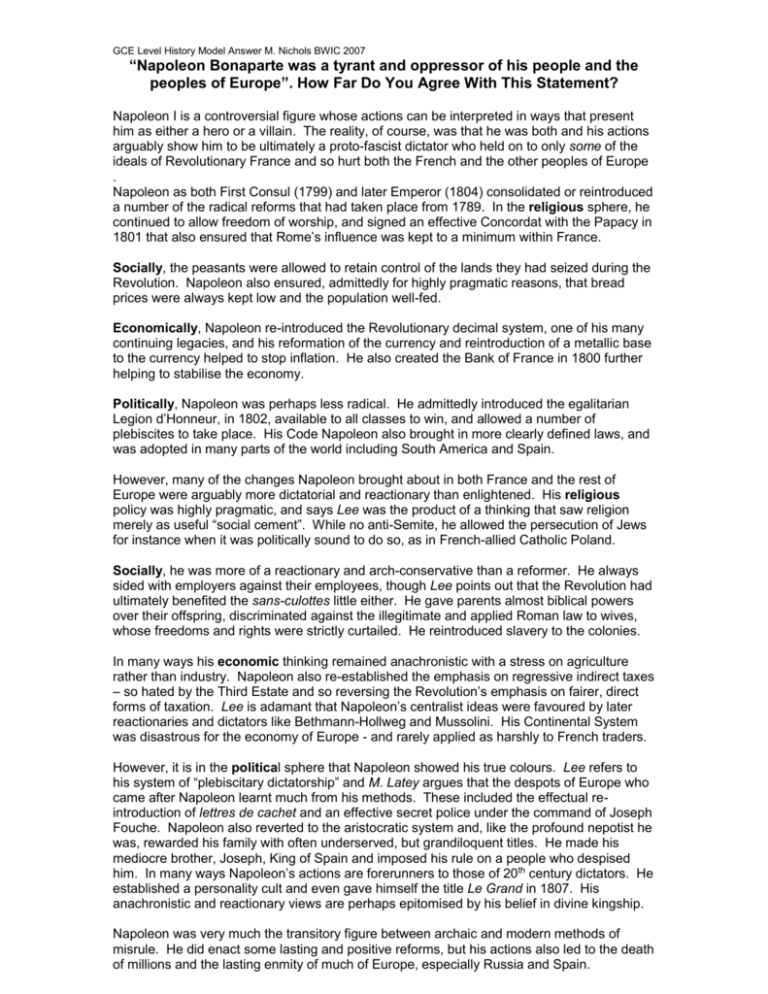
GCE Level History Model Answer M. Nichols BWIC 2007 “Napoleon Bonaparte was a tyrant and oppressor of his people and the peoples of Europe”. How Far Do You Agree With This Statement? Napoleon I is a controversial figure whose actions can be interpreted in ways that present him as either a hero or a villain. The reality, of course, was that he was both and his actions arguably show him to be ultimately a proto-fascist dictator who held on to only some of the ideals of Revolutionary France and so hurt both the French and the other peoples of Europe . Napoleon as both First Consul (1799) and later Emperor (1804) consolidated or reintroduced a number of the radical reforms that had taken place from 1789. In the religious sphere, he continued to allow freedom of worship, and signed an effective Concordat with the Papacy in 1801 that also ensured that Rome’s influence was kept to a minimum within France. Socially, the peasants were allowed to retain control of the lands they had seized during the Revolution. Napoleon also ensured, admittedly for highly pragmatic reasons, that bread prices were always kept low and the population well-fed. Economically, Napoleon re-introduced the Revolutionary decimal system, one of his many continuing legacies, and his reformation of the currency and reintroduction of a metallic base to the currency helped to stop inflation. He also created the Bank of France in 1800 further helping to stabilise the economy. Politically, Napoleon was perhaps less radical. He admittedly introduced the egalitarian Legion d’Honneur, in 1802, available to all classes to win, and allowed a number of plebiscites to take place. His Code Napoleon also brought in more clearly defined laws, and was adopted in many parts of the world including South America and Spain. However, many of the changes Napoleon brought about in both France and the rest of Europe were arguably more dictatorial and reactionary than enlightened. His religious policy was highly pragmatic, and says Lee was the product of a thinking that saw religion merely as useful “social cement”. While no anti-Semite, he allowed the persecution of Jews for instance when it was politically sound to do so, as in French-allied Catholic Poland. Socially, he was more of a reactionary and arch-conservative than a reformer. He always sided with employers against their employees, though Lee points out that the Revolution had ultimately benefited the sans-culottes little either. He gave parents almost biblical powers over their offspring, discriminated against the illegitimate and applied Roman law to wives, whose freedoms and rights were strictly curtailed. He reintroduced slavery to the colonies. In many ways his economic thinking remained anachronistic with a stress on agriculture rather than industry. Napoleon also re-established the emphasis on regressive indirect taxes – so hated by the Third Estate and so reversing the Revolution’s emphasis on fairer, direct forms of taxation. Lee is adamant that Napoleon’s centralist ideas were favoured by later reactionaries and dictators like Bethmann-Hollweg and Mussolini. His Continental System was disastrous for the economy of Europe - and rarely applied as harshly to French traders. However, it is in the political sphere that Napoleon showed his true colours. Lee refers to his system of “plebiscitary dictatorship” and M. Latey argues that the despots of Europe who came after Napoleon learnt much from his methods. These included the effectual reintroduction of lettres de cachet and an effective secret police under the command of Joseph Fouche. Napoleon also reverted to the aristocratic system and, like the profound nepotist he was, rewarded his family with often underserved, but grandiloquent titles. He made his mediocre brother, Joseph, King of Spain and imposed his rule on a people who despised him. In many ways Napoleon’s actions are forerunners to those of 20th century dictators. He established a personality cult and even gave himself the title Le Grand in 1807. His anachronistic and reactionary views are perhaps epitomised by his belief in divine kingship. Napoleon was very much the transitory figure between archaic and modern methods of misrule. He did enact some lasting and positive reforms, but his actions also led to the death of millions and the lasting enmity of much of Europe, especially Russia and Spain.
